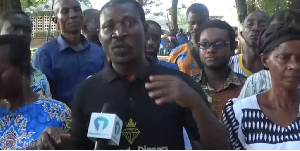Scores of mistreated women, drawn from five regions in Ghana, have taken to the streets of the Upper East region with a petition to President Nana Addo Dankwa Akufo-Addo to help put an end to some injustices they say are being done to rural women farmers.
Calling themselves the National Women Farmers Movement, they highlighted their grievances, not on the placards usually seen at rallies, but on the T-shirts they wore for the road rally in the regional capital, Bolgatanga.
“Women have the right to secured and titled farmlands. Eliminate gender-based violence against women. Give women mechanised tools, not policy rules. Promote market access opportunities for women. Increase investment for women farmers,” were some of the grievances emblazoned on the back of the red and white shirts.
The street march, supported by the ActionAid Ghana, was organised in commemoration of the International Rural Women’s Day with a banner in front showing the theme for the event: “Enhancing Market Access for Rural Women and Local Producers: Let’s End Gender-based Violence Now”.
“We have experienced unequal access to markets and other opportunities in the competitive business environment, resulting in dwindling profits and ineffective application of new and modern marketing strategies. We demand affirmative action in the implementation of policies to expand market access for rural women farmers that will include adequate and reliable market information.
“While we suffer untold hardship to transport our produce from often unmotorable terrains to big markets, we are not given standard weight measurement for our produce, leading to underpricing and unfair advantage for middlemen, competitors and large-scale producers,” they lamented in their petition, a copy of which was received from them by the acting Upper East Regional Minister, Frank Adongo Fuseini, on behalf of the President.
Women want Care Burden at Home reduced
The petition, which also cites lack of storage facilities and access to secured and titled land for farming purposes among the infringements the women said they had continued to suffer, drew the attention of government to the need to give smallholder women farmers due recognition and special consideration in the implementation of the country’s agriculture-related policies.
“We have suffered policy neglect, leading to poor and inappropriate targeting in policies and programmes with less resources and budgetary support dedicated specifically for Women Economic Empowerment (WEE) issues. We are demanding that smallholder women farmers and local producers are recognised and given special consideration in the implementation of the government flagship programme, One District One Factory.
“Whilst the smallholder woman farmer is already disadvantaged in many ways, she is further burdened by unpaid care work, which means that she is often denied the time and opportunity to pursue productive and profitable business to expand her livelihood options. We are, therefore, demanding the reduction of our care burden at home through the provision of facilities such as child care centres to save time in care duties. This will enable us devote more attention to our farming and small-scale businesses,” the group stressed.
Rearing for Food and Jobs Campaign to be launched\
The organisers of the road march, after the presentation of the petition had been done, brought stakeholders together to a forum dubbed “Smallholder Women Farmers’ Conference” at the Sacred Heart Catholic Social Centre in the regional capital.
There, a panel of three women farmers— Rita Ayita from the Talensi District in the Upper East region, Pogenaa Rosalia Babai from Nandom in the Upper West region and Grace Afra from the Banda District in the Brong Ahafo region— shared the grief of women farmers over underpricing, poor road network, destruction of crops and economic trees by herdsmen as well as lack of storage facilities and advanced food preservation methods for organic foods.
The Minister for Food and Agriculture, Owusu Afriyie Akoto, in a speech read on his behalf by a Deputy Director at the ministry and National Coordinator of the Savannah Zone Agricultural Productivity Improvement Project (SAPIP), Felix N. Darimaani, announced government’s plans to launch what he called the Rearing for Food and Jobs Campaign to improve the living conditions of Ghanaians.
“Interventions by the Ministry in ensuring farmers have access to mechanisation services include acquisition of tractors and small farm implements to augment the current Agricultural Mechanisation Services Centres (AMSECs) already in the country. An amount of 150 million US dollars Indian Exim Bank facility has been sourced for machinery and equipment to strengthen AMSECs across the country.
“Also, processes have been initiated in collaboration with the Brazilian government to set up a local factory to manufacture farm machinery and equipment suitable for small farms. The use of these equipment will reduce drudgery (labour) in land preparation and other activities along the value chain. The Ministry will ensure these equipment are gender-sensitive, and women are currently being trained to operate some of these equipment. In the livestock subsector (pigs, sheep, goats and poultry), the Ministry will soon launch the Rearing for Food and Jobs Campaign,” the minister stated.
Addressing the conference, the acting Upper East Regional Minister said President Akufo-Addo was committed to empowering rural women to enable them and their dependents live a quality life, adding: “It is in this light that the Social Protection Bill is being worked on assiduously.”
The National Women Farmers Movement comprises over 10,000 smallholder women farmers, according to the ActionAid Ghana’s Regional Programme Manager, Alhassan Sulemana.
“These gallant and hardworking women are doing some exciting and wonderful things in their various communities and at the national level, often under difficult circumstances. They have had to deal with cultural and traditional acts of violence, discrimination and other negative manifestations of patriarchy, social and economic imbalances. Yet their role is crucial to our national food security interventions and all other development programmes,” remarked Mr. Sulemana.
Regional News of Thursday, 18 October 2018
Source: starrfmonline.com

















